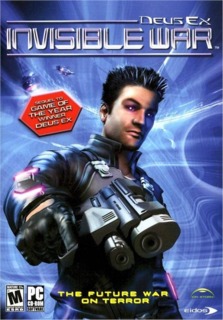A Question of Evolution
The first thing that undermines the first game's concept is the game genre. Though "Deus Ex" used the first person perspective, at its core, was a pure RPG. Now, "Invisible War" embraces the FPS mechanics, even if it still has RPG elements beneath it all. Action requires dodging and aiming, and accuracy cannot be evolved; in fact, the only thing that can be evolved in the game, are the weapons and biomods (in similar fashion to "Deus Ex"). Still on the RPG side of the game, there are still side-quests to be performed, people to talk to, and an engrossing storyline to follow through. Still, it is important to ask: why the change of genre? Personally, I think Warren Spector understood that classical RPG's where losing appeal, and more action oriented games where on the rise. More so, in the three years gap between these games, game design had been somewhat streamlined to the needs of the ever crescent casual players. And though this is arguable, I believe it was the right choice; "Invisible War" feels modern, user friendly, dynamic, fun and easy to play, even though it is less challenging and less engrossing than its RPG predecessor.
Thanks to smaller, more cohesive levels, level design also comes out as more linear and intuitive (thank God); unfortunately, this also means the game's environments are more claustrophobic, which stops the world from feeling alive and organic. Smaller levels also allow players to easily choose a path that is more suitable to their gaming style, avoiding the needless wandering that occurred in the first "Deus Ex", whenever the player had to search for a specific venting crawl or door access. All of these elements contribute to the more action oriented nature of the game, and are well intertwined with the FPS mechanics of the game.
On the narrative side, the second "Deus Ex" also feels like a mixed bag. Dialogs are much more consistent in terms of writing quality, giving a more mature tone to the plot and its thought-provoking philosophical ramblings. However, this just isn't enough to save the story that, besides remaining overly ambitious and somewhat ridiculous, is filled with plot wholes and disastrous, monotonic voice-acting. Choices in terms of narrative have again been neglected, and even though this time around there are a few more possibilities in terms of story, it is difficult to find them encouraging, since their consequences are not, in any way, experienced by the player. You could say that you can "imagine" the consequences, but even that pleasure is denied by the game, since characters and situations are so boring and one-sided that your brain will feel too numb and sleepy to give a damn about consequences. This is even truer, since the game is slightly more polarized in terms of "right" and "wrong", making it less morally provoking than its prequel.
The art behind the game is basically identical to its forefather, featuring dark moody backgrounds and colors, now adorned with some nice dynamic lighting effects that add a welcome contrast to the sets. "Blade Runner-like" synthesizer based music also makes a comeback, providing the appropriate sci-fi ambiance to the game. It is a shame that so little progress was made in this area, but even so, the game manages to be above average in this regard.
But it all comes down to: is it better than "Deus Ex"? The answer is no. It isn't better, but it can hardly be described as worse. It's like a different approach to the same motif. Even so, I remain true to my convictions: Warren Spector tried to create a new formula, instead of developing a cash-making, easy-to-produce sequel; in some aspects he succeeded, in others he did not. Like the first "Deus Ex", "Invisible War" is as promising as it is disappointing, a realm of possibilities that are never fully developed and that would only be fully fledged in future games… But, if you think about it, that's what sets Warren Spector's games apart from the rest: they are a visionary testament of what is to come.

